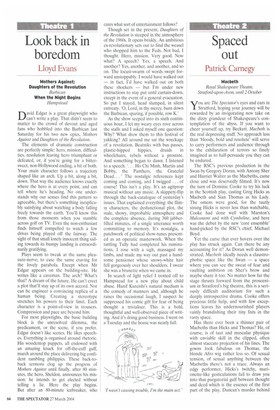Look back in boredom
Lloyd Evans
Mothers Against; Daughters of the Revolution Barbican When the Night Begins Hampstead TN avid Edgar is a great playwright who can't write a play. That didn't seem to matter to the crowd of devout and aged fans who hobbled into the Barbican last Saturday for his two new epics, Mothers Against and Daughters of the Revolution.
The elements of dramatic construction are perfectly simple: hero, mission, difficulties, resolution leaving hero triumphant or defeated, or, if you're going for a bittersweet, non-Hollywood ending, a bit of both. Your main character follows a trajectory shaped like an arch. Up a bit, along a bit, down. That way the audience knows exactly where the hero is at every point, and can tell where he's heading. No one understands why our senses find this pattern so agreeable, but there's something inexplicably satisfying about watching a body falling freely towards the earth. You'll know this from those moments when you stumble across golf on TV. Even the non-enthusiast finds himself compelled to watch a few drives being played off the fairway. The sight of that small lonely innocent thing sailing towards its bumpy landing is extraordinarily gratifying.
Plays seem to tweak at the same pleasure-nerve; to ease the same craving for the lovely parabola. Except when Mr Edgar appears on the building-site. He writes like a caveman. The arch? What's that? A dream of the future. He can't erect a plot that'll stay up of its own accord. Nor can he engineer a convincing replica of a human being. Creating a stereotype stretches his powers to their limit. Each character is a point-of-view in trousers. Compression and pace are beyond him.
For most playwrights, the basic building block is the unresolved dilemma, the predicament, or the scene, if you prefer. Edgar doesn't like scenes. He likes speeches. Everything is organised around rhetoric. His woodentop puppets, all endowed with an amazing knack for off-the-cuff guff, march around the place delivering big confident rambling philippics. These back-toback sermons clog up the progress of Mothers Against until finally, after 80 minutes, the hero, Sheldon, announces his mission: he intends to get elected without telling a lie. Here the play begins. But after an 80-minute icebreaker, who cares what sort of entertainment follows?
Though set in the present, Daughters of the Revolution is steeped in the atmosphere of the 1960s. It opens briskly. An ambitious ex-revolutionary sets out to find the weasel who shopped him to the Feds. Not bad, I thought. Hero, mission. Very good. Now what? A speech? Yes, a speech. And another? Yes, another, and another, and so on. The locust-swarm of words swept forward unstoppably. I would have walked out — in fact, I'd have walked out on both these shockers — but I'm under new instructions to stay put until curtain-down, except in the event of a general evacuation. So put I stayed, head slumped, in silent entreaty. '0, Lord, in thy mercy, burn down the Barbican, sparing, if possible, row K.'
As the show seeped into its sixth continuous hour, I let my weary eyes rove across the stalls and I asked myself one question: Why? What drew them to this festival of yakking? All around me sat the wreckage of a revolution. Beatniks with bus passes, plastic-hipped hippies, druids in wheelchairs, rebels without a prostate. And something began to dawn. I listened to a speech.'. . . Ho Chi Minh, Martin and Bobby, the Panthers, the Grateful Dead... ' The nostalgic references kept coming and coming, and I twigged ... of course! This isn't a play. It's an agitprop musical without any music. A skippety-flip through the back-catalogue of yesterday's issues. That explained everything: the flimsy characters, the dysfunctional plot, the stale, showy, improbable atmosphere and the complete absence, during 360 jabberfilled minutes, of a single utterance worth committing to memory. It's nostalgia, a patchwork of political show-tunes presented as an operatic masterwork. When the tattling Tully had completed his ruminations, I rose with a sigh, massaged my limbs, and made my way out past a handsome pensioner whose snowy-white hair fell gorgeously over her shoulders. I swear she was a brunette when we came in.
In search of light relief I trotted off to Hampstead for a new play about child abuse. Hanif Kureishi's natural medium is the comedy of manners and, although he raises the occasional laugh, I suspect he suppressed his comic gift for fear of being thought a trivialiser. This is a bold, thoughtful and well-observed piece of writing. And it's doing good business. I went on a Tuesday and the house was nearly full.


























































































 Previous page
Previous page